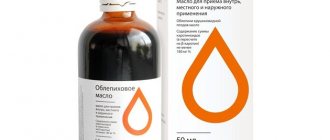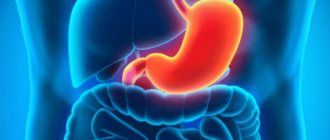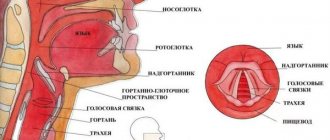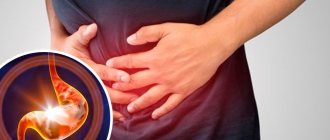We tell you what is actually the most common cause of gastritis of the stomach, what are the symptoms of the disease and what is the modern approach to effective treatment.
ELENA IONOVA
Journalist "KP" EKATERINA ZAGREBINA Candidate of Medical Sciences, gastroenterologist, hepatologist "SM-Clinic"
Diseases of the gastrointestinal tract (GIT) are among the five most common health problems in modern people. And gastritis - inflammation of the mucous membranes of the stomach - is the most common problem with the gastrointestinal tract. Unfortunately, many of us for a long time do not attach due importance to the manifestations of gastritis, “mask” the symptoms by uncontrolled use of drugs and folk remedies. There is also a myth that it is completely impossible to cure gastritis of the stomach; it will definitely return under stress and dietary errors.
Together with experts, we’ll figure out what actually is the most common cause of gastritis, how not to miss the first symptoms of the disease and how to choose a modern, competent treatment regimen.
Digestive processes in the human body
Our stomach is the most vulnerable organ of the digestive system. The most important and complex digestive processes take place in it:
- Mixing of food occurs in the stomach - this is a mechanical process.
- Next, the breakdown of food occurs there - this is a chemical process.
- And absorption of nutrients. If at least one of these processes goes wrong, the entire digestive system suffers, and all further stages of its work are disrupted.
Most often, the inner wall of the stomach is damaged, its mucous membrane, where the production of the most important components of digestion occurs - gastric juice and protective mucus.
Diagnosis of the disease
A doctor can identify the disease by a number of characteristic symptoms. To find out the causes of the pathology, a comprehensive laboratory and instrumental examination is necessary; the nature and composition of further treatment depends on this.
Main types of studies for gastritis:
- Esophagogastroduodenoscopy is a study of the condition of the inner wall of the stomach using a device with a probe equipped with a video camera. The analysis helps to identify areas of affected epithelium and the presence of ulcers and erosions on the mucosa.
- X-ray with contrast to identify nodes and erosions.
- Intragastric pH-metry - determination of stomach acidity to prescribe specific treatment.
- The Helicobacter breath test is a modern and highly informative method for determining the presence of Helicobacter pylori in the body by analyzing the carbon concentration in exhaled air.
- Study of gastric juice to assess the secretory function of the stomach.
Mandatory laboratory tests - general and biochemical blood tests, stool analysis.
Symptoms of gastritis of the stomach
Symptoms of gastritis can worsen due to errors in diet (a lot of fatty, spicy, salty foods), stress (it has been proven that in acute emotional situations the production of gastric juice increases), taking certain medications, severe fatigue, sudden changes in time zones if you travel.
But all these manifestations are a consequence of the fact that the stomach is unhealthy and needs help. The most common symptoms:
- Pain and heaviness in the abdomen.
- Bloating.
- Quick satiety, intolerance to certain types of food.
- So-called “hunger” pains, they occur on an empty stomach or during the day if you have not eaten for a long time.
- Also, with gastritis, pain often occurs soon after eating, especially if you have eaten heavily.
- Feeling of general discomfort in the abdomen throughout the day.
In fact, the most common cause of gastritis is the microbe Helicobacter pylori. The discovery of this microbe and proof of its destructive effect on the human stomach is one of the most important discoveries in medicine of the late twentieth century.
Dangerous Kiss
– Why does chronic gastritis often worsen in the fall? After all, we eat approximately the same throughout the year.
- Not at all. In the summer, we often go on picnics, where we not only overeat on barbecue, but also indulge in alcohol. Add to this poorly washed food and food infections - and the stage is ready for an autumn aggravation. In addition, during the off-season the immune system often weakens, which can also lead to exacerbation. After all, microbes cannot be discounted as the cause of gastritis.
Fast food is not to blame, diets are of no use. The main myths about gastritis Read more
– If gastritis is often caused by microbes, does that mean you can become infected with it?
- Yes. The discoverer of Helicobacter pylori, Australian scientist Barry Marshall , conducted an experiment on himself by drinking a solution containing a culture of this bacterium and fell ill with gastritis. The bacterium can also be transmitted from person to person through dirty hands, shared utensils, or kissing.
What causes gastritis of the stomach
In 2005, Australian scientists Barry Marshall and Robin Warren received the Nobel Prize in Medicine or Physiology for the discovery of a microbe that causes gastritis of the stomach, as well as for the development of a fundamentally new system for diagnosing and treating this disease.
For the first time, people started talking about the “microbial” theory of gastritis somewhere in the mid-80s of the twentieth century. Marshall and Warren discovered a microorganism in analyzes of the gastric mucosa of patients with gastritis and named it Helicobacter pylori. Nobody believed the scientists back then: it was believed that the hydrochloric acid released in the stomach kills all living things, including any bacteria.
Colleagues laughed at Marshall even when he accomplished a professional feat: he grew Helicobacter in a test tube, drank and... two weeks later he fell ill with gastritis!
Helicobacter pylori is a bacterium that damages various areas of the stomach and duodenum. Many cases of gastritis are associated with contamination of the mucous membranes by Helicobacter.
It was only recently that reliable evidence of the theory was obtained. It turned out that insidious bacteria do not die in the stomach because they secrete a special enzyme - urease, which neutralizes hydrochloric acid.
In 2015, the medical journal Attending Physician published a large-scale study conducted in Germany by several medical centers and laboratories in Berlin and Hannover. The authors of the study said, in particular, the following: Helicobacter is transmitted through hands, saliva, dishes, kissing, etc. The microbe can enter our body with contaminated food and water. Then it settles on the gastric mucosa and multiplies, forming microbial colonies. And it begins to corrode the mucous membrane - this is how foci of inflammation appear, which lead to gastritis of the stomach. The authors of the German study write: “Infection with Helicobacter pylori can lead to an inflammatory response, increased gastric acid volume and gastritis.”
How to cure gastritis forever?
Gastroenterology Tags:
Yulia Titova: The program “Stomach Express with Doctor Vyalov” is on air. There are three of us in the studio today, Oleg Druzhbinsky, me, Yulia Titova, and Sergey Sergeevich Vyalov, candidate of medical sciences, gastroenterologist, hepatologist French clinic, GMS clinic, author of more than 140 published works.
Sergey Vyalov: I am very glad to see everyone, and it is very gratifying to understand that there is an active interest, after all, in the state of health today, and many listeners are interested in this issue.
Oleg Druzhbinsky: Today we will talk about the most, most interesting topic related to our gastrointestinal tract, gastrointestinal tract, we will talk about gastritis: what it is, where it comes from, how to treat it, what it threatens us with and how to get rid of it .
Yulia Titova: Of course, let's start with the basics, with the basics, so to speak. As a doctor, tell us ordinary people what gastritis is, what it is?
Sergey Vyalov: Let's turn to some clarity. Surely each of us fell in childhood. Everyone has fallen, and everyone remembers what an abrasion is, when we fell, flew on a hard surface, on the ground or on asphalt, tore off the surface layer of our skin and everyone perfectly imagines before their eyes this red, swollen surface, which is a little damp, maybe , oozes a little, and when we look at such skin, we understand that there is inflammation here. Inflammation is a universal process that can occur in any organ and looks approximately the same: red, swollen, inflamed, wet, a large number of immune cells come to this place, which begin to fight and take active action. The same thing can happen in the stomach. We call inflammation that occurs specifically in the stomach gastritis. Accordingly, we need to try to ensure that such inflammation occurs in the stomach.
Oleg Druzhbinsky: And where does it come from, this inflammation?
Yulia Titova: How to survive until gastritis, what should you do?
Sergey Vyalov: We ourselves contribute to the occurrence of inflammation in the stomach. In some cases, it happens that the reason does not depend on us in any way. For example, some kind of infection entered the body and caused inflammation in the stomach. And sometimes we eat something wrong, or do the wrong things, take pills, and this also causes inflammation in the stomach. It has a typical stereotypical character: everything is red, everything is inflamed, everything is swollen, it hurts, and we feel it, it begins to bother us.
Oleg Druzhbinsky: To cause an abrasion on the wall of the stomach, this must be some kind of chemical process? Gastric juice is sour, we poured something else into the acid, soda, forfeits or cola, and together with the gastric juice a reaction began and we burned through the wall of our stomach - this is what it looks like?
Sergey Vyalov: Our task now is not to understand all the subtleties, nuances, mechanisms of development, the main thing for us is to understand the principle of what is happening. That is, the stomach wall is destroyed. It can be destroyed under the influence of one reason, or under the influence of several reasons. Nobody prohibits the action of several factors simultaneously. This could be a little bit of the influence of the soda you mentioned, a little bit of the influence of pills, a little bit of the influence of some kind of infection, a little bit of the influence of something else. As a result, we add up all the factors and we end up with severe damage. Perhaps each individually would not cause significant harm to the stomach, but if we added them all up, we received a significant blow.
Oleg Druzhbinsky: Let’s get some practical advice right away. In order not to strike the wall of the stomach, what exactly should you not do?
Yulia Titova: Perhaps we’ll move on to nutrition? Exclusion of certain products.
Sergey Vyalov: We have 8 most common causes that lead to gastritis, inflammation in the stomach. Of these 8, some depend on the person himself. The first reason is nutrition, the second reason is alcohol, the third is smoking, the fourth reason is stress. The remaining 4 do not depend on the person himself. These are other processes triggered by other factors, we can also name them now. This is the influence of infection, for example, bacteria and viruses can also cause inflammation in the stomach. These are various immune disorders, the influence of bile and the effect of medications - side effects, of course.
Oleg Druzhbinsky: Let's go through the points. The first is nutrition. What exactly should you not do?
Sergey Vyalov: We will probably focus on the fact that the first and main factor is irregular nutrition. We should eat first when we feel hungry. If we feel hungry, our task is to love ourselves and our body, and satisfy this feeling of hunger. If we stop loving ourselves and don’t pay attention to the feeling of hunger, then we slowly develop inflammation in the stomach.
Oleg Druzhbinsky: That is, if you want to eat, suck a little, you need to throw something into yourself. If you don't throw it, you'll get injured there. It's clear.
What about alcohol?
Sergey Vyalov : Alcohol is a more piquant issue, but we must bring some understanding to this situation. When we talk about the liver, we can talk about the effect of alcohol on the liver. Today we will talk exclusively about the stomach. When we eat or drink something, it all goes through the esophagus into the stomach in a couple of seconds. There is, let's remember the number: 2 hours. Accordingly, if we put something wrong there, this “wrong thing” will damage our stomach for 2 hours. Therefore, when we talk about alcohol, it is important for us to understand which alcohol has an irritating and damaging effect on the stomach. This concerns the strength, not even the quantity, but rather the strength of the alcoholic drink, and we are interested in the dangerous interval in relation to the stomach, somewhere from 25 to 75 degrees. The interval is undesirable.
Oleg Druzhbinsky: Taking strong alcohol on an empty stomach causes injury. Do I understand correctly that the stomach should be full or lubricated?
Sergey Vyalov: This will slightly reduce the damaging effect. From this range, we settled on a convenient, or more or less stomach-safe, strength range of up to 25 degrees. Everyone knows perfectly well what alcoholic drinks go there, with the exception of 2: champagne and beer. Because of the carbonation. Because gas is carbon dioxide and the stomach does not need additional acid.
Everyone drank beer. Let's abstract ourselves and imagine. We came to the store and bought one bottle of beer. Does this happen? Several, right? Some. Several bottles of beer. Each bottle is half a liter. Half a liter for several bottles - it turns out to be 2 - 3 liters. What volume is this? How much will it take for another person to drink a 3-liter can? Well, in an hour or two, in 2 hours. Imagine the volume of alcohol, and even carbonated with carbon dioxide, which also stretches the stomach, and even contains special substances specific to beer that stimulate inflammation and stimulate infection.
Alcoholic drinks with a strength above 25 degrees, as well as champagne and beer, are dangerous for the stomach.
Oleg Druzhbinsky: You say terrible things. Imagine, I just thought, what if we had some kind of sensor inside our stomach that would broadcast to us on the display what is happening there. And the sensor immediately gives us the following message: “Why, you idiot, did you drink beer? The walls of your stomach are being eaten away.”
Sergey Vyalov : I will surprise you: we have such a sensor. It's built-in.
Yulia Titova: Our nerve endings.
Sergey Vyalov : Of course. They tell us all the information about what's going on there. Let's take this example. You drank a glass of boiling water. This is a very strong physical, temperature factor that damages the mucous membrane in the oral cavity and stomach, respectively. If you drink a glass of boiling water, and even in one gulp, you feel that something is starting to hurt? When we drink alcohol, it dulls the sensations in the nerve endings, it clouds our consciousness a little, so we simply don’t feel it.
Oleg Druzhbinsky: We did not touch upon the topic of smoking. There is a well-known formula that you should not smoke on an empty stomach. I have heard this more than once, I would like to know why? And what exactly is smoking for the stomach, why is it harmful?
Yulia Titova: I have a myth about nicotine and the stomach. The myth is that when we smoke, nicotine remains on the mucous membrane and we swallow it to some extent and it enters the stomach and has a negative effect on this organ.
Sergey Vyalov : Let's partially debunk this myth. On which mucous membrane does nicotine remain?
Yulia Titova: Language, this zone. We swallow it with saliva together.
Sergey Vyalov : No, this is a zone that absorbs very strongly. Therefore, nicotine enters the blood.
Yulia Titova: That is, it does not enter the stomach in any way.
Sergey Vyalov : From the mucous membrane - no. But, unfortunately, when smoking we inhale a large amount of tobacco smoke, which contains carcinogenic tars that have the potential to cause cell degeneration, and smoke with nicotine, which acts mainly on blood vessels. Basically, this smoke enters the lungs, but we breathe through the lungs. But, unfortunately, some part of the smoke is involuntarily swallowed and enters the stomach. Tars have a carcinogenic effect, and nicotine constricts blood vessels, which, in principle, is not very critical for a healthy person. But, if this is combined with some other damage, or with an irregular diet, or with alcohol, which is often combined, then this already leads to inflammation in the stomach and reduces its resistance to damage.
Oleg Druzhbinsky: I see. Now it's stressful.
Yulia Titova: As a lady, I am very interested in this factor – stress. How does it affect my stomach, gastritis?
Sergey Vyalov : Ladies are especially susceptible to stress, ladies worry very often. Many ladies suffer from perfectionism, many worry. Women have another special factor that occurs monthly, and which can change the condition due to the action of hormones throughout the body. Therefore, ladies, of course, are more susceptible to stress. And older women have hormonal changes, which, unfortunately, reduces their protection from all external factors - both from fat and from other damaging influences. Therefore, we must take this point into account. But, in principle, we are all susceptible to stress. We live in such a world, wherever you look, look around - everyone is worried. Some kind of paradox, a mystery: for some reason one person is nervous and not sick, while the other is nervous and everything has gone to hell for him. Therefore, it is important for us, as doctors, to understand by direct or indirect signs whether stress in a person is associated with damage to the stomach, or are these independent things? Because it is very tempting to say that you are nervous, which means stress is causing your inflammation. But we must clearly differentiate and distinguish between a person for whom stress causes stomach problems and a person for whom stress is not related in any way.
Oleg Druzhbinsky: How to distinguish this? It's probably not easy to distinguish?
Sergey Vyalov : This is perhaps the most difficult question for doctors. The key here, of course, is inspection. Based on the examination of the patient, we can either confirm or refute this connection based on direct or indirect signs. If there is a direct cause-and-effect relationship, when a person has now had an episode of stress and he has stomach pain, or some kind of discomfort right away, here the reason becomes obvious. We don't have to guess too much and do ultra-precise surveys.
Yulia Titova: Can we say that this somehow affects our immune system? It is not clear to me how the pain occurs.
Sergey Vyalov : The main symptom is pain, which occurs due, oddly enough, to the action of hydrochloric acid in the stomach. It is always there for everyone. But, some people have pain, some don’t. When inflammation begins, swelling appears, the cells of the stomach seem to stretch, additional space appears between them and acid begins to penetrate there, and we feel it. This is what causes pain. And stress is, of course, directly related. Because against the background of stress, we experience a certain tension in the nervous system and this affects vascular tone. The young lady became nervous and turned pale, why? Vascular spasm occurred, her blood pressure dropped, and she fainted. Direct effect of stress on blood vessels? Direct. And the same thing happens in the stomach. If the protective forces there disappear due to stress, then, of course, the damage intensifies, or the production of hydrochloric acid increases, there is many times more of it in the stomach and it damages us more.
Yulia Titova: And it seems to me that the most obvious effect of stress on our stomach and the development of gastritis is that we start to “sharpen” something, drink something, someone starts smoking a lot. That is, it is a kind of guide from bad habits to the stomach.
Sergey Vyalov : No, I don’t agree with you. Because stress is stress, we understand that this influence is through nerve endings. But if we already have stress, which gave 20 points minus to our stomach, and we started to eat, we added another minus 20, washed it down with alcohol - added another minus 30, lit a cigarette - added another minus 10, then in the end we already have not gastritis, sorry, but an ulcer. Or, in general, some big disaster happened.
In fact, stress ulcers have probably heard such a word? Here lies a philological trap. Because in this concept we can include 2 different conditions: inflammation of the stomach, which is associated with nerves, which we just talked about, and the second is a serious condition for the body, which is not nervous stress, but stress in the broader sense of the word. Stress, like overload, like intense activity. For example, against the background of serious illnesses, stress ulcers and stress gastritis occur, associated with the severity of a person’s condition, and not with stress, when he became nervous and had emotions. But, unfortunately, the word is a general one, Hans Selye introduced it, and since then we have been lumping everything we can into the word “stress.”
Oleg Druzhbinsky: Indeed, for me the nature of stress is generally mysterious, because it is not necessarily some kind of negative news, it can be good news. I was very happy - this is also stress, in fact, to celebrate, I drank and did a lot of other things. And bam - your ulcer opens, and away you go. Everything hurts terribly, you don’t want to live, it’s time to switch to porridge and steamed cutlets, you think life is over and everything else.
Sergey Vyalov : Come on, then we’ll switch to steam cutlets. (addresses Yulia Titova) You had gastritis. Do steamed cutlets help?
Yulia Titova: Absolutely. At least they are digested much easier and easier on the stomach.
Oleg Druzhbinsky: I don’t really believe in all this. Like everyone else, I probably went through a period when I felt that something was wrong with my stomach. I switched to porridge. I’ll be honest, you eat porridge, and you immediately feel more soulful, warmer, and lighter. But it seems to me that these are some kind of psychological things. Will you tell the truth, what is really happening? Porridge, steamed cutlets...
Yulia Titova: Let's talk about the diet for gastritis.
Sergey Vyalov : Everyone thinks that you need to follow some kind of diet to cure gastritis. But this is not entirely true. “Therapeutic tables” made some contribution to this; perhaps you heard: “therapeutic nutrition, table No. 1, table No. 2, table No. 3, table No. 5, table No. 10” and so on. Unfortunately, before, once upon a time, when we did not have effective medications at our disposal, we were forced to undergo treatment for a very long time, we could not somehow influence the situation. Our only remedy then, long ago, was to exclude harmful foods from the diet, which in relation to the stomach were called “table No. 1”. The point of this table was that we had to remove everything harmful: fried, salty, fatty, and so on. Usually doctors print out on a piece of paper those foods that are harmful and help people, doing a good deed naively, write down what they need to eat.
Oleg Druzhbinsky: So is this a myth or what?
Sergey Vyalov : They write what you should eat, as a template, as an example, as an example of what you can eat. The main thing in the diet lies in the second column, what you can’t eat, because what you can’t eat worsens your stomach condition. In order to improve it, we take pills. But it’s difficult for us to remember what we can eat. For the average person, how many dishes would you list? About 20, those that we routinely eat. And routinely we eat the wrong food: we can’t do this, we can’t do this, we can’t do that... And we grab our heads: what to eat? What's left? We need a hint, some kind of template: tell me what is there? And for some reason, everyone began to perceive the column on what is recommended to eat as something that needs to be eaten and must be eaten in order for the stomach to heal. Although, this is a template recommendation, what other options remain when we have removed the harmful ones.
Diet recommendations focus on prohibited foods
Oleg Druzhbinsky: So, in fact, do we need to eat and will we be saved from ulcers, for example?
Sergey Vyalov : We need not to eat, remove from our menu only what is harmful. Everything else is possible. But this is very difficult to understand: what remains, tell me? This is such an abundance of options, and in our head there were only 20. Now we crossed out half, crossed out fatty, crossed out fried, crossed out smoked, crossed out spicy, carbonated and marinated with vinegar. What's left? Here's who ate what. I ate this, I got an inflammatory process in my stomach and was told that I couldn’t eat it. What will remain? I need a template, I can't come up with it myself. My 20 dishes that I eat most often were banned. In another person, gastritis was caused by a different reason. For example, he took pills, he got an infection, and he seems to be eating right, he doesn’t eat anything harmful, he thinks: “How? How? I eat normal healthy food, but I still have gastritis.” Therefore, he does not need to exclude anything from his diet.
Oleg Druzhbinsky: That's what it's all about! That is, if you have developed gastritis due to poor nutrition, you constantly pour ketchup on fried meat, then this needs to be changed. What if there is another cause for gastritis...
Sergey Vyalov : Maybe there is no need to adjust the diet.
Oleg Druzhbinsky: Maybe you shouldn’t smoke on an empty stomach, for example, or eat pills at random. That is, you were treated for something else, but these pills caused gastritis in you.
Sergey Vyalov : Yes, this happens. Or, a person has a headache - again, let’s go back to young girls who often have headaches. Or to men who sit at work, they are constantly stressed, have a responsible position and they also have a headache. Does this happen? Yes it happens often. What do we do when we have a headache? We take painkillers. And painkillers are a group of drugs that have side effects primarily on the stomach. If we drink painkillers on a regular basis, for more than 3 - 5 days, then this is guaranteed to lead to a slight inflammation in the stomach, and if we drink them constantly because our head hurts all the time, or we drink because our legs, arms, joints hurt, or what - or after a heart attack we take aspirin on a lifelong, long-term basis, then this will definitely lead to inflammation in the stomach.
Oleg Druzhbinsky: That is, first of all, you need to remember that what you put inside yourself can burn out somewhere, and you need to be prepared for this and insure yourself in advance.
Fine. We were going to talk about the famous bacterium Helicobacter pylori. I’ll read a brief historical background now, and then you can comment on the question. So, friends. “In 1979, Australian pathologist Robin Warren discovered the bacterium Helicobacter pylori. Further research by her together with Barry Marshall, professor of clinical microbiology at the University of Western Australia, proved the connection between Helicobacter pylori infection and the development of chronic gastritis. It would seem that the long history of gastritis has come to an end.” In my own words, I will not read further, it was decided that it is because of the bacterium Helicobacter pylori that gastritis begins in our stomach, and, accordingly, then an ulcer. It would seem that if we, as they say, pinch this bacterium and slam it down, then there will be no gastritis. But some doctors still doubt this advanced technology. Question to Dr. Vyalov: what do you say to this?
Sergey Vyalov : I will say that common sense has not been canceled. Therefore, as we have already said, if a person, excuse me, drinks alcohol in unrealistic quantities and does not have any Helicobacter, then he will still have inflammation in the stomach. It will be anyway. That is, we must treat Helicobacter as one of the 8 reasons.
Oleg Druzhbinsky: That is, this is one of the reasons when you talked about infections, bacteria and viruses. I understand that it is not the most important in your ranking?
Sergey Vyalov : I always explain with some kind of list, and I’ve never thought about why I rank it this way. Apparently, by frequency of occurrence. Probably, after all, Helicobacter is the 4th point among those patients who come to me. The first point, after all, is food.
Oleg Druzhbinsky: On the first point is food, on the second is alcohol, on the third is stress, probably? Or smoking?
Sergey Vyalov : Stress comes in last place because it is very difficult to assess. Here, rather, it is a question of proving this process. Debatable. But, in general, from the stomach, I’ll tell you, you can see everything. Fate may not be visible, but everything else is visible. Therefore, there is not always even a need to conduct additional examination. That is, sometimes it’s enough just to visit a doctor, just do an examination of the abdomen and it becomes clear whether additional examination is needed, whether additional examination is needed, and if necessary, what kind.
But with regard to Helicobacter, we, unfortunately, are forced to resort to additional examination in any case. Because it is impossible to determine by eye or with your hands whether this microbe is in the stomach. Here, unfortunately, we must state the fact that the most accessible test for Helicobacter is a breath test. Respiratory, the most accessible, which is widespread everywhere, can be done everywhere and is cheaper than stit. It is due to its availability that it is used for screening and mass examinations to determine whether there are risks or not. Let me emphasize: not Helicobacter, but risks! Because this test does not detect bacteria, but the waste products of this microbe. Waste products. Therefore, having received a “plus” on such a test, we must recheck it in a reliable way. Many people do not want to do repeated or clarifying tests, but received a positive test for Helicobacter, which needs to be rechecked. It seems that everyone has Helicobacter. If a person drank some water before this, or smoked a cigarette, or has excess bacteriocenosis in the intestines, he will definitely get a positive result. Why? This is such a technique. Very often gives a false positive result. False and positive.
Oleg Druzhbinsky: So simply because there were residues of something in this water, therefore this test shows a positive result?
Sergey Vyalov : Yes. Therefore, this test, despite the fact that it is the most common, helps us understand who definitely does not have Helicobacter, and if the test gives a positive result, we need to double-check. This is a huge myth that is practically impossible to destroy; we are trying to do this in different ways, including today. If you receive a positive breath test, this does not mean that you have Helicobacter, you need to recheck, and does not mean that everyone has Helicobacter. This impression is due to the fact that we often have false positive results.
The breath test for Helicobacter pylori must be rechecked if the result is positive.
Yulia Titova: Information has reached me that this bacterium, within certain limits, can be present in the body, but does not harm in any way. But, if it goes beyond the norm in quantity, then problems begin. It is not true? That is, in principle, a healthy person should not have it.
Sergey Vyalov : A healthy person should not have it. But we know that there are different microbes, right? Cholera, plague, anthrax. They are especially dangerous because they immediately cause illness and immediately kill a person. And there are not particularly dangerous infections that can have a chronic course and exist in humans for years. Helicobacter is not a particularly dangerous infection. That is, you shouldn’t be super afraid of her. But it is important to understand that in some people Helicobacter can cause ulcers, and in others Helicobacter can cause atrophy and then stomach cancer. But for some, Helicobacter may not cause anything.
Oleg Druzhbinsky: Still, Sergey, what is the reason? How can Helicobacter pylori cause cancer?
Sergey Vyalov : Harmful bacteria differ from beneficial bacteria in that they are distributed free of charge. We have to treat the bad bacteria and buy the good ones.
Yulia Titova: Question about the infectious variant. Is it possible to transmit an infection that will cause gastritis or ulcers by airborne droplets or through mucous membranes? How does this happen? Is it possible to transmit the infection from person to person?
Sergey Vyalov : Let's expand the scale. Helicobacter is the most common infection that lives in the stomach. Its disadvantage is that when it gets into the stomach, it makes a “house”, and the immune system cannot get it out of there. Therefore, she lives there for a long time, if not forever. We need to treat it with antibiotics, like any other infection. It is the duration of its residence that leads to either an ulcer or stomach cancer.
But we can limit ourselves only to Helicobacter, which is transmitted through hands, dishes and saliva. At the same time, when we look at the route of transmission, it is important to understand that this bacterium must first be isolated from one person. Maybe he won’t single her out, maybe that’s it? Maybe there is very little of it, or a lot, but not enough to highlight it? He has bacteria, but he cannot transmit it. Next, this bacterium must get to another person, it may or may not get there. This bacterium must pass through the immune gate and not be killed at the entrance - it may or may not be killed. It must get into the stomach and have time to build a “house” there. When a married couple lives together, it is clear that they have frequent contact and very, very close contact, that is, the likelihood of getting bacteria at home in this situation is, of course, greater than in public catering or on the street. However, it happens that one of the spouses has Helicobacter, and has been for a long time, but the other does not and does not arrive.
Yulia Titova: Do families suffer from gastritis? Does such a situation happen?
Sergey Vyalov : Previously, we believed that stomach cancer and stomach ulcers were hereditary. And now we understand that this is intra-family transmission of Helicobacter pylori infection.
Oleg Druzhbinsky: So, after all, Helicobacter is the main provocateur of stomach diseases, or not?
Sergey Vyalov : One of the main ones.
Yulia Titova: Helicobacter, and also gastritis, the ulcer is manifested mainly by one symptom - constant pain in the stomach or pain provoked by the intake of food.
Sergey Vyalov : There may be additional symptoms. This may include heartburn, belching, nausea, an unpleasant taste in the mouth, heaviness in the abdomen, fullness, bloating, early satiety, and sometimes even flatulence and gas.
Yulia Titova: This systematically happens constantly and on an ongoing basis, right?
Sergey Vyalov: We must and are obliged to take care of our health. But, since the healthcare system cannot always force those people who do not want to take care of themselves, therefore, we ourselves must control it. If any of the symptoms listed: abdominal pain, heartburn, belching, nausea, unpleasant taste in the mouth, some kind of heaviness, overcrowding, early feeling of fullness, lack of hunger appear regularly, God forbid, every day, for 2- x weeks, then this is a reason to consult a doctor.
Oleg Druzhbinsky: Still, I’ll clarify. I have repeatedly heard calls from very respected doctors in our studio: “Consult a doctor.” But doctors can be different, you know? A good doctor like you can give a good recommendation, but a not very trained doctor you go to will prescribe you some pills. After all, a clear-headed person wants to figure it out himself.
Sergey Vyalov: Dear listeners! Pay attention to healthcare! This is a field of activity that does not give you health, but gives you a path to return it, and this path, in fact, is a service, the same as any other service. This can be comparable to a hairdresser's service, a car service, or a manicure. There are masters, some of whom do better, others do worse, therefore, it is necessary to treat this area of medical services in the same way as other services: look for a competent specialist with whom the correct mutual understanding is established. If the doctor speaks, but the patient does not hear, or the patient speaks, and the doctor does not hear simply because of some everyday things, there will never be success on this path. Without contact, without feedback between the patient and the doctor, nothing can be cured.
Yulia Titova: This is if they reached the doctor. We also like to self-medicate; this is generally our favorite pastime.
Oleg Druzhbinsky: This is a separate topic. They do a lot of self-medication related to herbal medicine, they drink decoctions, gastrological ones, completely different ones, all sorts of St. John's worts, I won't list them now. Something helps, something harms, people read various advertising articles on the Internet that this is “Collection No. 3 for all diseases,” as is usually the case. What to do about it? Surely such patients come to you and self-medicate? What happens to them later if the case is so advanced and it is unclear what to do with it.
Sergey Vyalov: Sometimes you have to re-treat. Retreat after self-medication, even so.
We got so busy today that we didn’t answer the audience’s questions. We will meet, there is a transfer plan, we will meet tomorrow and the day after tomorrow, and I think we will look in detail at gastroscopy, which everyone is afraid of, should it be done or not, should we be afraid of this procedure, in general, is it necessary or No? When to treat Helicobacter? Why does it cause symptoms in some people and not in others? In whom can it actually cause symptoms, and in whom is it a completely painless infection? Why are there “silent” ulcers that don’t hurt? What to do with the notorious duodenitis?
Yulia Titova: Excellent plan, rich for the next program. But we have to say goodbye now. In the studio was doctor Sergei Vyalov, gastroenterologist, hepatologist, candidate of medical sciences. Sergey, thank you very much for your detailed and understandable story!
Treatment of gastritis of the stomach
In September 2015, the so-called Kyoto consensus was published, which defines the gold standard of gastroenterology.
It states that in the treatment of gastritis, eradication is recommended, that is, the elimination of the bacterium Helicobacter pylori. Without this, treatment may be ineffective, and there is a high risk that the symptoms of gastritis will return again and again. Since Helicobacter is a bacterium, the treatment regimen for gastritis includes antibiotic therapy. But this is not a panacea. Here's what Russian experts say: “The widespread use of antibiotics to eliminate Helicobacter is associated with significant problems. Among them is a decrease in the effectiveness of treatment due to resistance (addiction) to antibiotics. The Kyoto Consensus noted concerns about this, in particular, an increase in allergies or obesity, a violation of the composition of the intestinal microbiota (microflora)” (data from the Central Research Institute of Geology, State Budgetary Institution of Health, Moscow Scientific Research Center of the Moscow Health Sciences Center, published in the journal “Attending Physician” in 2016).
On average, more than 70% of adult Russians experience symptoms of gastritis. For some, these are episodic manifestations that are “extinguished” by painkillers and enveloping drugs, for others, gastritis becomes chronic and makes itself felt with any errors in nutrition or stress. It is important that in most cases, gastritis is caused by the proliferation of the bacterium Helicobacter pylori on the gastric mucosa.
Acute and chronic gastritis
Acute is the nightmare of any person who has been diagnosed with this disease. During exacerbation the following are observed:
- severe pain;
- vomit;
- bloating;
- temperature increase;
- internal bleeding.
Moreover, it is worth noting that acute gastritis can be caused by alcohol, spicy food, taking antibiotics, allergies or severe stress. If the disease is neglected, there is a high probability of developing ulcers.
Chronic - it is distinguished by its “secrecy”, so it cannot be immediately recognized. The disease proceeds unnoticed and worsens only when taking potentially dangerous foods and medications. In the event of an attack, patients experience similar symptoms as during an exacerbation.
Innovation
Scientists have begun searching for substances that are less traumatic for the body and effective in combating Helicobacter.
And in the course of numerous studies, it turned out that a pronounced positive effect is observed when taking certain beneficial bacteria. Among the numerous beneficial bacteria that have a positive effect on the microflora of the stomach and intestines, there are those that also fight “bad” bacteria, in particular Helicobacter. They have also been shown to increase the effectiveness of drug therapy in the treatment of gastritis and reduce the side effects of taking antibiotics.
The search for truly effective and safe remedies against Helicobacter took many years.
Modern diagnostic and treatment technologies
If there are atrophic changes, then diagnosis is difficult due to the focal nature of the process. More accurate data is obtained using biopsy material at the time of chromoendoscopy. To obtain more reliable results, doctors developed and introduced a serological diagnostic method into practice. Patients interested in whether chronic gastritis can be cured forever should first of all undergo an examination and establish an accurate diagnosis. Serological diagnosis makes it possible to use a non-invasive screening diagnostic method. To obtain a more accurate histological characterization, patients are recommended to undergo endoscopy in the future.
Modern treatment tactics are primarily based on the clinical manifestations of the morphological and etiopathogenetic form of the disease, diagnostic results, and the prevalence of Helicobacter.
At the first stage, therapy is reduced to getting rid of the presence of Helicobacter pylori. If it is necessary to treat chronic gastritis with high acidity, proton pump inhibitors are used in combination, which reduce the release of hydrochloric acid.
During the course of treatment, both morphological and endoscopic monitoring should be mandatory. This allows you to control the therapy and make the right adjustments.
Diet for gastritis of the stomach
Of course, to achieve a positive effect in the treatment of gastritis, you need to adjust your diet. This does not mean that now you will have to eat only pureed soups, mashed porridges and wash it down with rice water for the rest of your life. But you need to adhere to certain restrictions: in case of inflammation of the gastric mucosa, you must temporarily exclude spicy, fried in oil, salty foods, fermented products (kvass, beer, black bread), foods with added vinegar, strong broths, mushrooms, carbonated drinks. In the acute stage of gastritis, you should also not lean on fresh vegetables and fruits, they increase fermentation. Vegetables are best eaten stewed or boiled. White, dried bread is preferable. You will have to give up any alcohol during treatment.
Don't overeat. It’s better for your stomach if you eat small meals (5-6 times a day every 3-4 hours).
How to choose the right nutrition
For each form of gastritis, a separate diet is prescribed, which the patient must follow for the entire period of treatment. But it is still possible to highlight individual foods and dishes that are allowed to be eaten with gastritis. Among them:
- broths from lean meat and fish,
- dietary meat;
- steamed casseroles and cutlets;
- baked and boiled vegetables without seasoning;
- porridge cooked in water;
- boiled chicken eggs.
Some patients are prescribed baby food during an exacerbation. However, we advise you to consult a doctor and not select diets on your own.
This is interesting
It should be noted that Helicobacter pylori is one of the most common human infections; residents of megacities are more likely to suffer.
According to Russian scientists, the prevalence of this infection in Moscow is 60.7 - 88%, in St. Petersburg - 63.6%, in the cities of Eastern Siberia - up to 90% (data from the TsNIIG GBUZ MKNTs DZM published in the journal "Treating Doctor" in 2016). The less processed and the simpler the product is prepared, the healthier it is for the stomach. Boiled or baked meat is healthier for the stomach than sausages and frankfurters.
Drink water 30-40 minutes before meals (a glass of warm water drunk before meals normalizes stomach acidity). At the same time, do not drink during meals or immediately after it, but at least after half an hour or an hour.
Chew your food thoroughly. If food enters the stomach in large pieces, this creates additional stress, causing discomfort and bloating.
In the evening, try to eat at least three hours before bedtime, and preferably four. Don't sleep after a big lunch.
Don't get used to enduring pain and discomfort. If you begin to “feel” your stomach, immediately consult a gastroenterologist.
Numerous studies show that the main problem in the development of gastritis of the stomach is damage to the mucous membranes by the bacterium Helicobacter pylori. And eliminating contamination with this bacterium is the gold standard of gastroenterology today. It is clear that no diet in the world can get rid of Helicobacter. This requires complex therapy.










